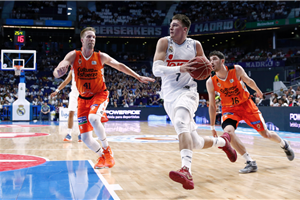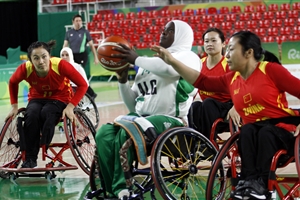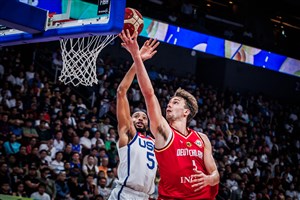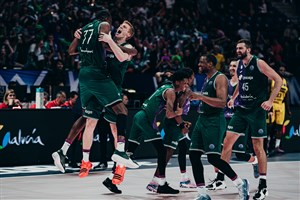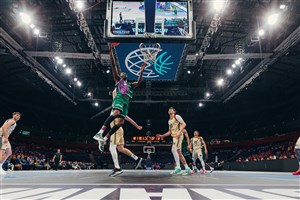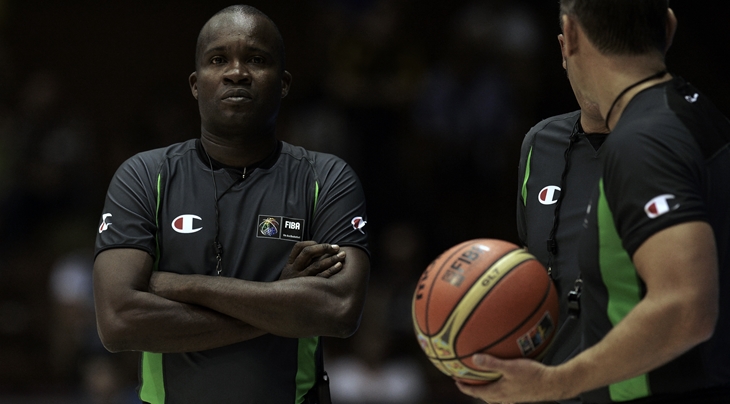
Good luck to the whistleblowers
MELBOURNE (Paulo Kennedy's View from Downunder) - It's been great getting back on the horse this week interviewing players and coaches around the NBL ahead of Round 1, which tips off next Thursday in Brisbane.
There is always excitement at this time of year after the pre-season tournament, but this year things have gone up a notch with quality players coming into the league and almost all of last season’s stars hanging around. It's reason for real excitement.
There is one area where there is always an air of uncertainty, however, and that’s refereeing. Our whistleblowers get a raw deal from the Australian basketball public at times – myself included – and I think the inconsistency at the Rio Olympics certainly brought that back into focus.
That said, what people always want from officials in any sport is consistency. I’ve written many times that I believe a big factor in that is leadership, just like it is in a sporting team. If referees receive clarity as to how the league wants the game called they will deliver that more often than not.
Butler is boss
This off-season the NBL made two good moves to sure up the top end of their refereeing crew. The first was the recruitment of arguably Australia’s greatest referee, Scott Butler, into the role of Head of Referees, previously known as the referees manager.
Butler was regarded as one of the great game managers by players and coaches, but he is also known as someone who won’t accept something he believes is sub-par and can be a pain to deal with if he feels others aren’t reaching the standards he desires. That’s a good attribute in this role.
More than that, his knowledge of both the international and NBL games is exceptional, and from that I hope we see a ‘best of both worlds’ style of officiating emerge over this season and beyond.
This is also very important with the new home and away FIBA Basketball World Cup qualifying system coming into place, where we will need refs who will be able to step into the international game and not need time to adjust to that style of officiating.
Pro refs
The second move was to appoint Michael Aylen and Vaughan Mayberry – who have worked five Olympics, seven FIBA Basketball World Cups and almost 1000 NBL games between them – as full-time referees to lead the panel. One notable international coach told me Aylen is “a pretty damn good referee”, while Mayberry is a standout with his game management.
What’s so important about these appointments is it should allow this pair to produce their best more consistently. Up until now they have had to mix the demands of their full-time job with trying to referee at an elite level. Switching from one mindset to another isn’t always the best preparation for a game.
Now, they get to dedicate their professional time to being better prepared physically, better prepared for the teams they will be calling, reviewing games in more depth, helping other referees on the panel and contributing to referee development around Australia in New Zealand.
I wrote last year that appointing a small panel of full-time refs, and complementing them with a part-time panel made up of talented emerging refs (not older officials who make the same mistakes year in, year out) is the way to go, and hopefully this is the first step in that direction.
Now we look to see what impact Butler, Aylen and Mayberry can have when it comes to delivering consistent calling, and ensuring we have quality refs available for World Cup qualifiers come the end of 2017.
Right direction
Talking to players and coaches this week a common theme was the refereeing at the Australian Basketball Challenge (ABC) in Brisbane was certainly much-improved over the lead-up practice games, which some felt were severely over-officiated.
I thought at the ABC the referees called the game reasonably tightly but for the most part didn’t overly-impose themselves. There were some exceptions where things went too far, however there were plenty of missed shots and turnovers too – no one is perfect.
That nice balance allowed the games to flow very well, with players adjusting quickly to the way things were being called. There was very little ugly physicality that ruined the spectacle because players knew they would be whistled.
Of course, a much bigger challenge comes once the real stuff starts, the players are playing for keeps and the coaches roll out the team defensive strategies aimed at slowing offences to a standstill.
Room for improvement
Two issues that arose for me at the ABC were the calling of the charge/block situation and the calling of fouls used to deliberately slow the fastbreak.
The charge/block was called the traditional Australian way, that is in favour of the defence, which encourages ground-based play and not aerial play, as I have written about many times before.
Sadly, we also saw referees continuing to issue flop warnings, which don’t work in the NBL because falling after minimal contact is as likely to be deemed a charge as a flop. Until that gets sorted defenders will continue to hit the deck and I understand why.
The open-court foul was called very inconsistently at the ABC, and clubs certainly weren’t reluctant to use that tactic. This needs addressing worldwide, but the NBL must be at the forefront because attracting viewers in this country relies on attractive basketball.
Both these types of calls can have a big influence on how good a game is to watch. If you punish the help defenders who step under elevating players then the offensive team keeps attacking the basket, where highlights happen.
If you consistently punish deliberate fouls in the open court you will reduce the temptation to use a foul to slow the break. I don’t think there are too many NBL fans who want to see less players putting heat on the rim and less teams looking to score in the open court.
The test will be improvement over time, particularly in the area of consistency, where teams can potentially lose faith in the whisteblowers.
Good luck to all our referees in season 2016/17, you play a very underrated role in determining how entertaining our great game is, and this is a season when we need the exceptional talent in the NBL at its entertaining best.
Paulo Kennedy
FIBA
FIBA's columnists write on a wide range of topics relating to basketball that are of interest to them. The opinions they express are their own and in no way reflect those of FIBA.
FIBA takes no responsibility and gives no guarantees, warranties or representations, implied or otherwise, for the content or accuracy of the content and opinion expressed in the above article.

